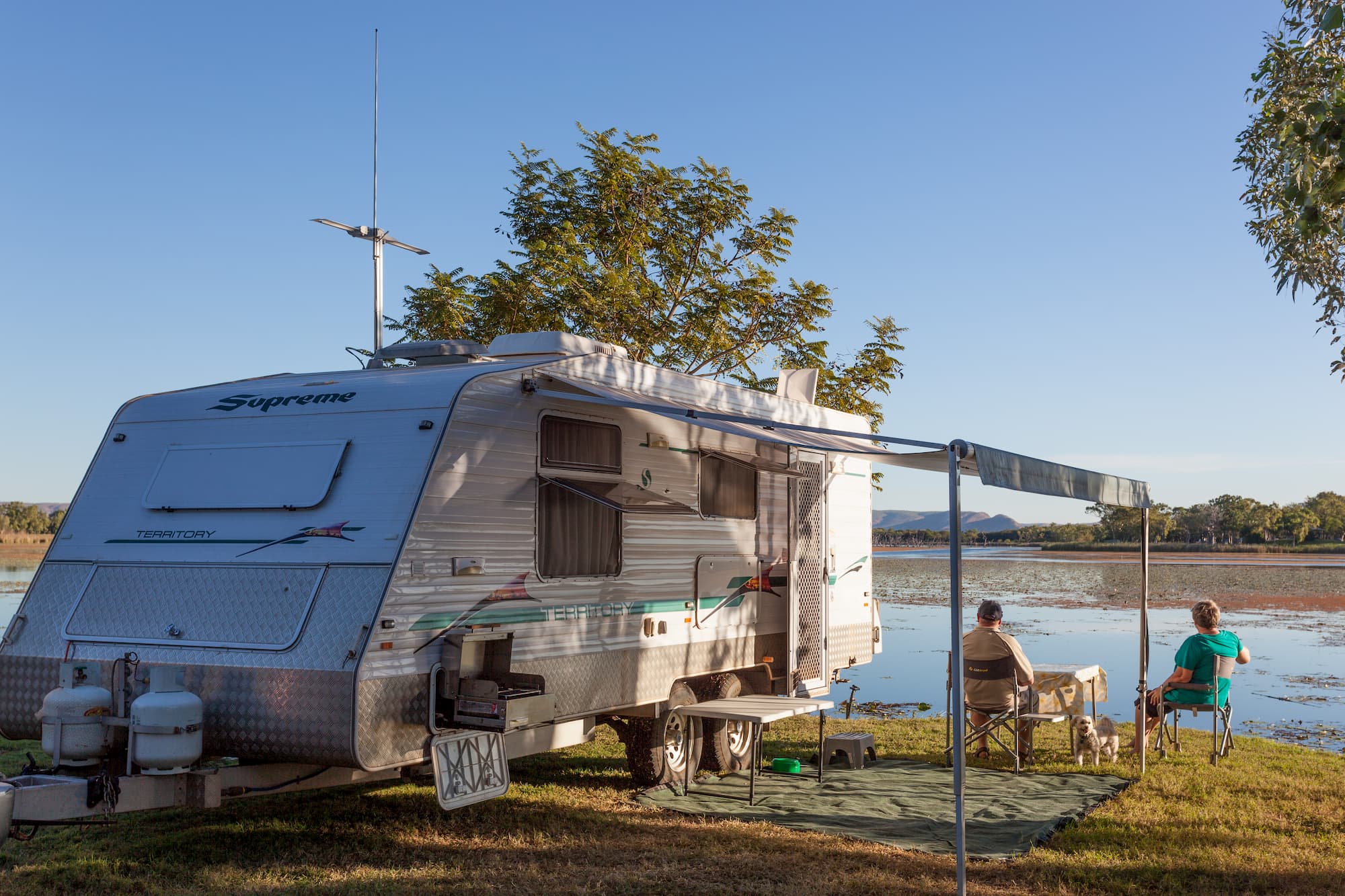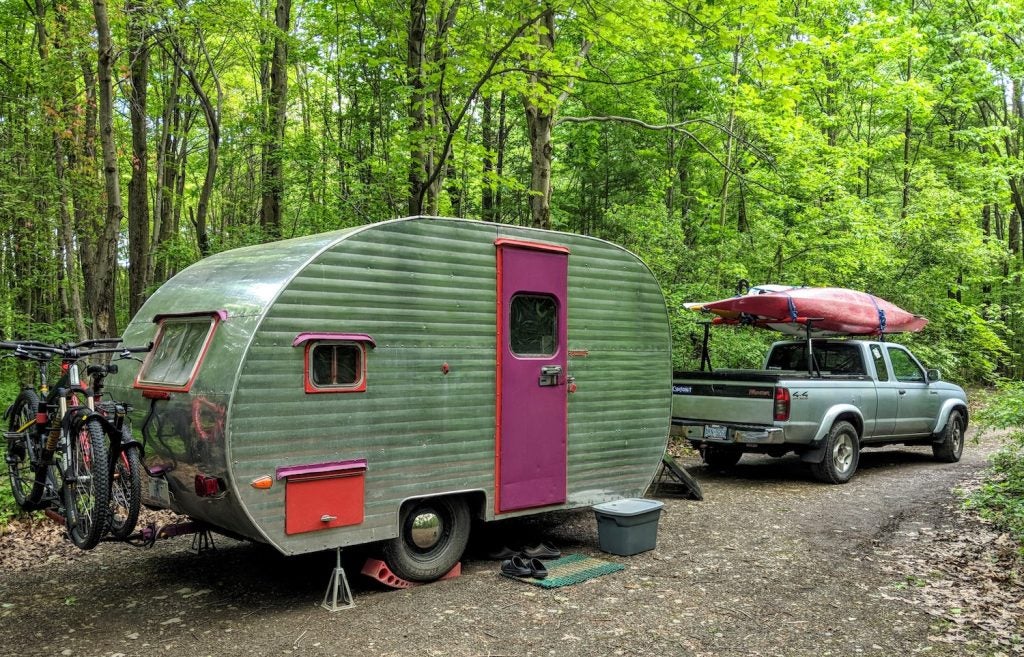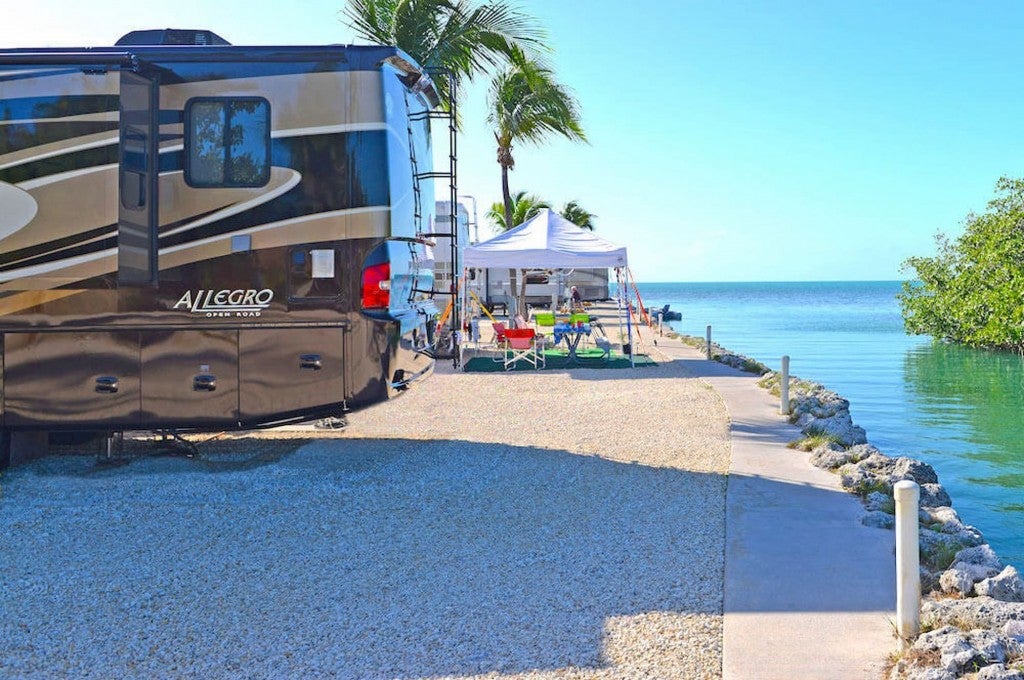Years before our parents, Jim and Margaret, retired from careers that put four kids through college, they came up with a plan they called “The Four M’s of Retirement: Money, Muscle, Memory, and Meaning.”
It defined their goals for living “the good life” long after leaving the workforce. They saw wealth not just in terms of how much money they set aside, but in how much vitality remained in their bodies, how engaged their minds were in the world, and in what made getting out of bed worthwhile.
Before we knew anything about RV retirement, our assumptions came from what we’d seen in advertisements—tanned retirees driving luxury motorhomes into a desert sunset and long stays at manicured RV parks, marking out the golden years. While the slick ad copy appeals to some, it failed to inspire us. We hadn’t yet seen the diversity of RVs and people living on the road on their own terms. Nor had we experienced it for ourselves.
Thoughts of the four M’s kept resurfacing when we began traveling in our own tiny RV. We marveled at how the full-time camper life seemed to be a shortcut to “the good life,” even though we were decades from traditional retirement. Our lifestyle cost a quarter of what it used to, we had more time to be active outside, the natural places we frequented became our classroom, and being somewhere new filled each day with excitement we had not felt in years.
And we are not alone.
Along our travels we’ve met countless others—some retired, some almost there—who have discovered how life in RV retirement can help target the “four M” sweet spot. We chatted with a few and their responses are truly enlightening.
Living the “4 M’s” through RV Retirement
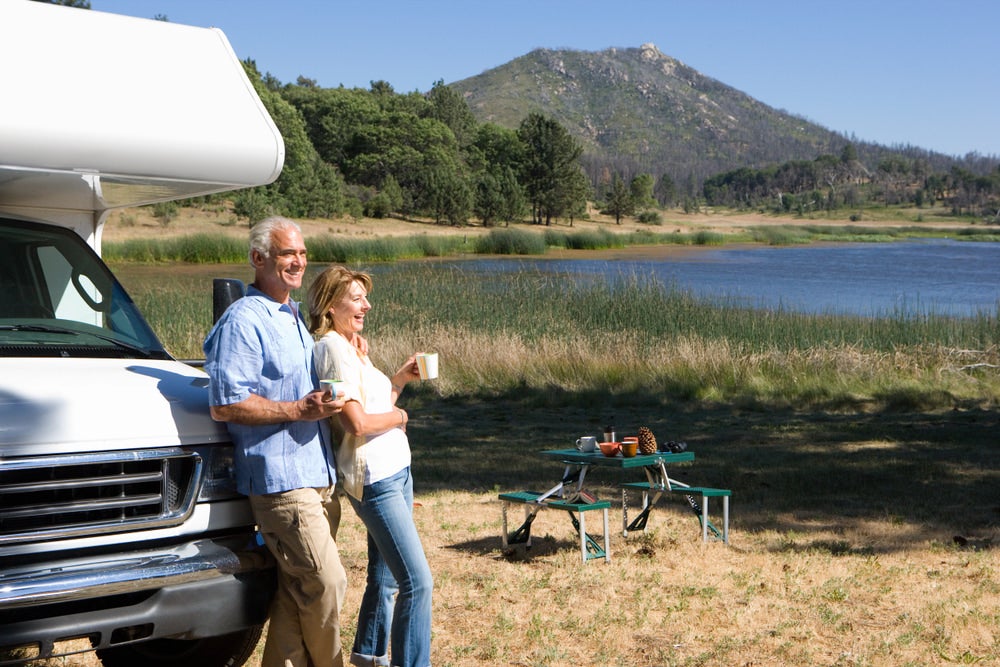
1. Money
Carol and Peter Owens spend five months of the long Canadian winters traveling in their RV, and much of the summer sailing their boat on the shores of Lake Huron. Both retired from long careers with good pensions and benefits, providing enough income to travel nearly half the year and keep their home. They picked up their first RV trailer on a whim, and almost immediately drove it to Florida for four months.
As they learned about living in an RV, they worried about finances, having never before traveled or left a home base for so long.
As sailors, they usually spend two to four weeks every summer in the North Channel of Lake Huron, an archipelago of islands with hundreds of free anchorages. During that first winter, they chose less expensive campgrounds and RV parks whenever they could, focusing on forest service, state, and national parks. They rarely went out to eat, preparing meals in their camper or outside, and chose museums, visitor’s centers, and walking along the beach rather than more expensive forms of entertainment. Eight years later, they’re old pros at stretching their budget through the months of travel without deprivation, practicing the tricks of practiced road warriors.
An income stream cannot just be turned on the first day of retirement unless it has been established by prior action. Just like money, the other factors must be laid down by continued focus during your working life. — Jim Hutchison
Here are some of the best RV retirement saving tips:
Point Your RV West
Any atlas of the United States shows where the majority of public lands are located. The U.S. Forest Service, Bureau of Land Management (BLM), Army Corps of Engineers, national parks, and national monuments all provide beautiful, inexpensive campgrounds or free dispersed camping, and can really help center your RV retirement goals.
Pat McGarry from Louisville, Kentucky admitted, “I’d never even heard of BLM land before getting on the road, and now those are my favorite places to camp.”
Once Carol and Peter Owens started going west each winter, they stopped worrying about making reservations and instead found joy and challenges in discovering beautiful locations to park it for a while. They prefer remote areas not only to stretch their budget but also for the solitude and connection to nature.
Go With Solar Energy
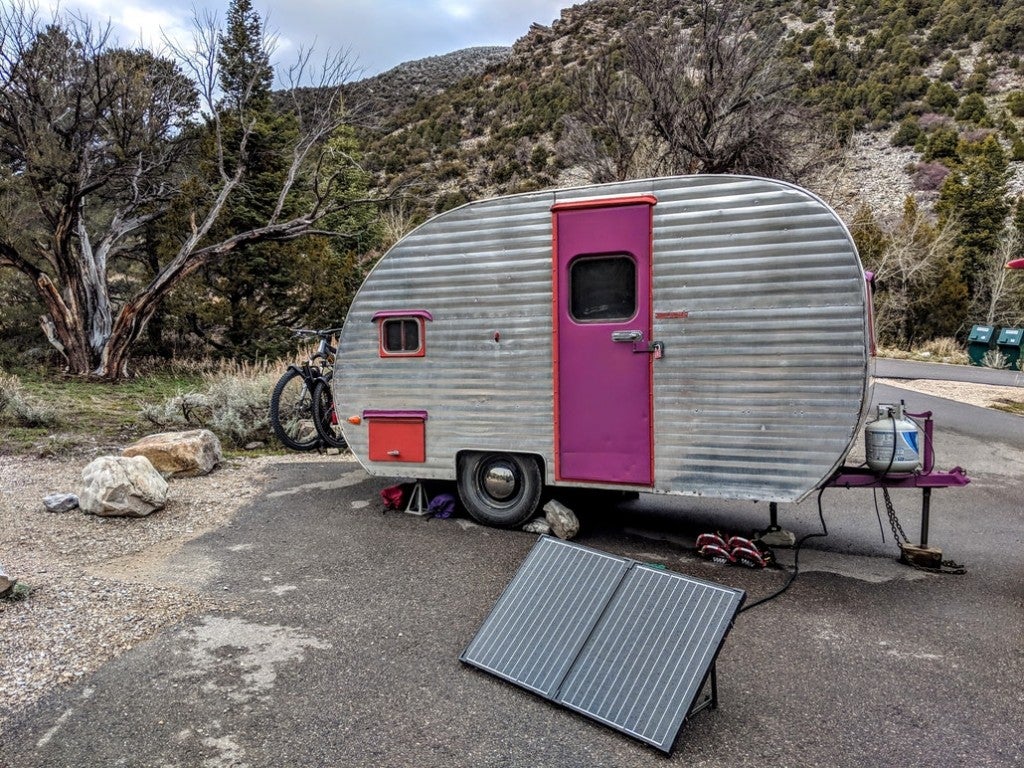
Image from The Dyrt camper Shari G.
Charging the batteries with solar panels means the lights and appliances can stay on without needing to be plugged into an expensive campsite. One full-timer we talked to—having just recently begun RV life—expressed urgency around her solar install because the noise from the generator was so disruptive to those around her. Solar panels won’t annoy the neighbors.
Don’t Eat Out, Eat Outside
“We’ve probably only cooked inside about five times,” Pat McGarry told us. “Only when it was raining. Otherwise we were cooking outside on the grill or two-burner stove, and we loved it. ” The McGarrys set up their outdoor kitchen and used it to not only stretch their budget but also their living space, preferring to be outside as often as weather and temperature allowed.
Choose Boondocking
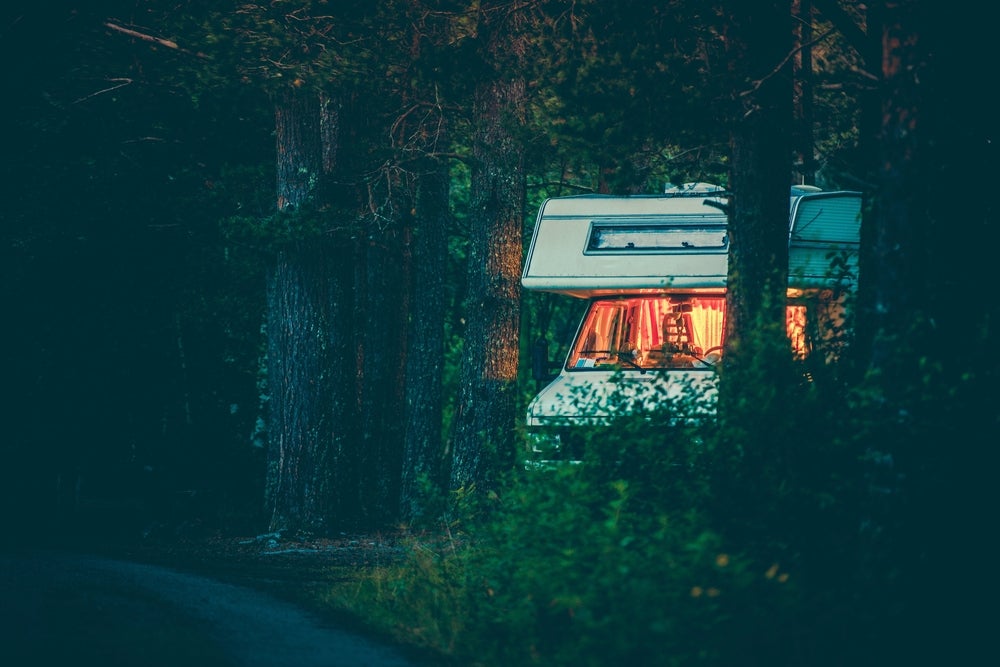
Many public lands allow campers to stay for up to 14 days without relocating for little to no fee, and some even offer low-cost permits for longer stays; making RV retirement much cheaper. The less an area charges, the fewer services they provide (water, electricity, toilets, showers).
However, most RVs are designed to “dry camp” for at least a few days, so with a little bit of preparation, creativity, and practice, anyone can do this for a short time. Boondocking can refer to camping at a primitive campground with no hookups, or parking at a winery, casino, or on the side of a forest service road for the night.
Carol and Peter Owens began boondocking six years ago, just a few days at a time, before returning to campsites with service. This winter they spent nearly two months unhooked.
Find Entertainment in the Natural World
The Senior National Park Pass for anyone over 62 is $80 for a lifetime and cuts camping fees literally in half.
Bob Buntrock pointed out that he got his when it was only $10, but even at $80 for a lifetime, “I don’t know any deal better than that!”
These beautiful RV retirement destinations offer more than just stunning visuals from the front seat. For anyone interested in human history, natural history, ecology, geology, hiking, boating, wildlife viewing, and more, the national parks offer both entertainment and destination.
Dollar Stores Provide More Than Savings
Cathy, a semi-retired traveler in a 1996 Roadtrek van named “Sunny,” commented that she hasn’t yet started living off her retirement income.
During her first few months on the road, she focused on saving every penny and worried about splurging on dinners out with friends or other luxuries that she used to take for granted as a working person. These days, she worries much less about money, though she still keeps it frugal by going to the dollar store before anywhere else. Not only does she save money on some essentials but she also gets a feel for the communities through which she travels. Coming to terms with when she is going to splurge and when she’s going to pinch pennies has really helped her find a balance with her travel goals.
2. Muscle
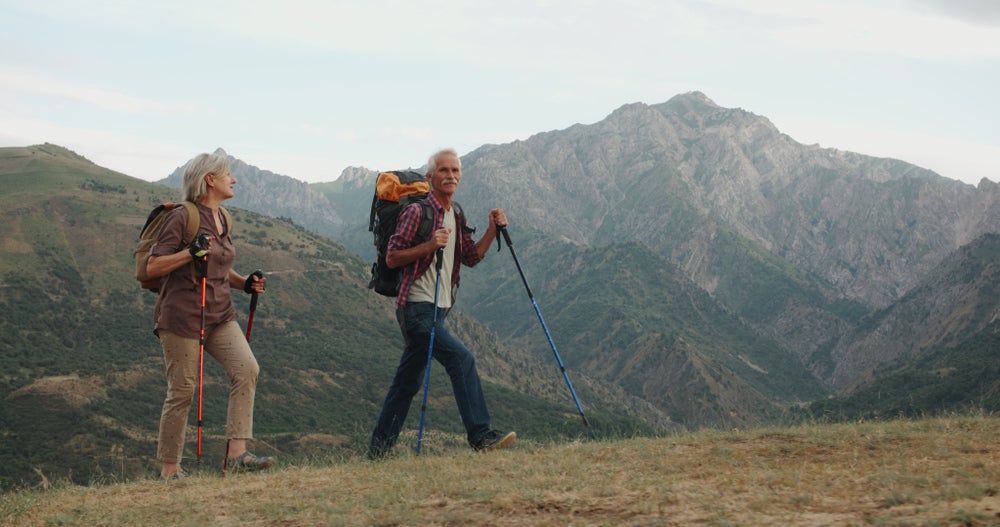
Exercise, exercise, exercise, it’s the most important thing a retiree can do. — Jim Hutchison
Few people launched themselves into full-timing with the same zeal as Pat and Barb McGarry. With their launch date chosen years before, they sold their excess belongings and their house, moving into their 22-foot travel trailer at the nearby state park months before Pat’s last day at GE, which was also his 60th birthday.
By the next morning they were out of town and headed for the nearest national park.
“You don’t know what you are going to see!” said Barb. “The unknown of what’s out there really drives us.”
They both found hiking to be their favorite activity in RV retirement; each day they’d wake early and plan to explore the trails in the park or nearby. “We’d end up hiking anywhere from five to ten miles a day, and if you do that five days a week, getting all that sunshine, you can’t help but feel better and healthier than when we were both going into work every day.”
During their first 18 months of RV retirement, the McGarrys wandered the country discovering their favorite hikes. They set up their trailer on BLM or Forest Service land near other public areas they wanted to visit. From this temporary basecamp, they could drive to any trailhead in the vicinity. They surprised themselves by how little they hung around the trailer.
They found the landscapes so inspiring and so different from their hometown of Louisville, KY—it motivates them to keep moving. Pat says that even the daily chores of setting up camp, cooking outside, and getting water all are all prolonging his healthy life.
Cathy loves both mountain biking and kayaking, so many of her destinations provide good opportunities for one or the other. Mindful of her current abilities, and sometimes aching knees, she hopes to retain what she has through stretching and resistance training, “before aging has other plans.”
Many of the folks we talked with mentioned that being outside and enjoying the natural world was a major contributing factor in their decision to go full or part-time with RV retirement. Spending time close to the best trails for hiking or mountain biking motivated them to get out and enjoy it. When you’re living in an RV, “getting exercise” probably doesn’t mean going to the gym—it’s achieved by simply getting outside and enjoying wherever you happen to be.
3. Memory
Many RVers seek to visit the natural wonders of our country, but it’s not enough to visit just to see it. The experience is enriched through curiosity. Why is this place here? Why is it this way? And why can I now access it in the way I can? — Jim Hutchison
Public lands can play a big role in intellectual stimulation; each state or national park has a specific reason for its creation, usually something geologically or historically unique and amazing. Much of the park’s time, resources, and staff are dedicated to educating the public. A few respondents noted that they never really spent much time in Visitor Centers before RV retirement. While on vacation from their jobs, the McGarrys never felt they had the time to watch the park film or browse through the exhibits at their leisure—they always wanted to be out on the trail.
“As long as you keep your curiosity level up, you never know what you’re going to find.”
Dedicating time to learning the history, culture, and ecology of a place now better prepares them to take in the unique landscapes, flora, and fauna that each park protects.
“As long as you keep your curiosity level up, you never know what you’re going to find,” said Barb McGarry. “Learning how much we didn’t know about the world we live in has a way of humbling, of inspiring awe, and of making new connections between us and this big blue planet. This small reminder of something we didn’t know also makes us wonder, what else don’t we know?”
“Travel itself is stimulating, but it causes you to act and think differently than you would at home,” said Bob Buntrock. He and Gloria never fully cut loose from their home base for longer than five weeks at a time, but their annual trips are always a highlight. Bob describes how they love to spend weeks researching a travel destination and learning what they might want to see along the way.
Their travels were also inspired in part by the beautiful books on national parks that Bob fondly remembers from his hometown library in Minnesota. When Bob and Gloria discovered a pair of nesting Sandhill Cranes on their property, they decided that a trip to see other destinations along crane migration routes was in order. This linked their backyard to a larger network of ecosystems and wetlands spanning thousands of miles and helped them see the world through the eyes of this ancient bird.
The daily decisions of traveling during RV retirement—not just the logistics of buying groceries, doing laundry, and making reservations—but getting from one place to another, facilitates engagement with the moment.
Even with GPS navigation, and apps like The Dyrt, we still have to choose where we want to camp and which route offers the most scenic or direct way. Many respondents found the challenge of moving around so engaging that they stopped making reservations altogether. To help planning, we used The Dyrt PRO, where we downloaded maps and campgrounds to use offline. Committing in advance to a specific campground or route is simply too limiting, and might limit the unexpected.
We noticed that folks simply lit up while sharing their fascinating travel stories. The memories sparked other memories, and stories sparked other stories. Sharing our stories is just one more way to keep minds and memories healthy.
4. Meaning
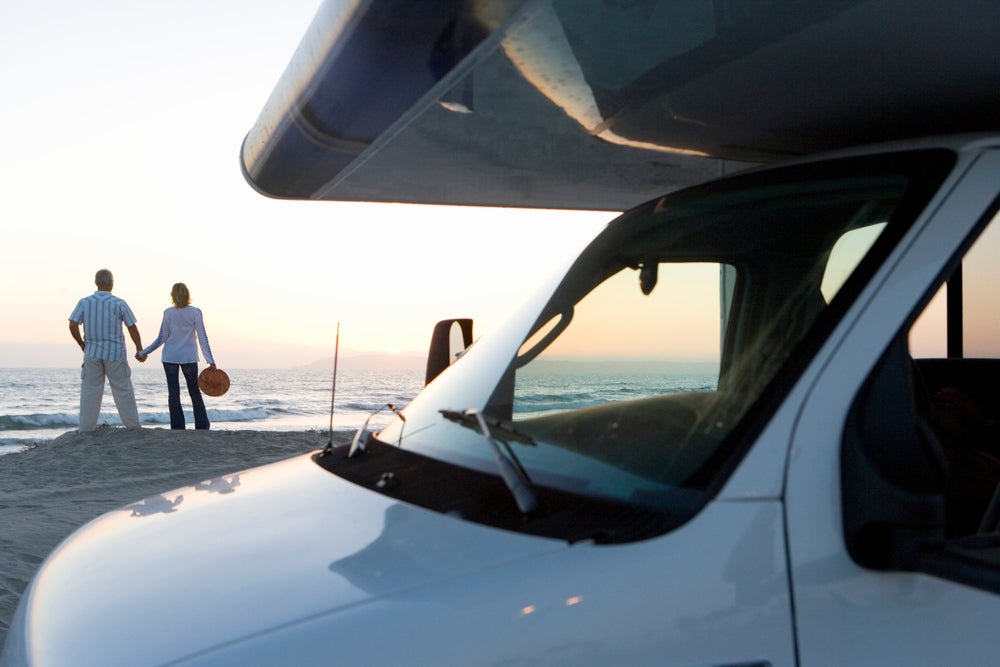
The opportunity to meet new people, to show them love, non-judgmental respect, and acceptance, spreads the meaning you’ve found in your life and that enriches the lives of others. — Jim Hutchison
Many people are worried about leaving their hometown, hobbies, and friends for a different life on the road. But many retirees find a way to travel and stay connected to those they love, all while creating new relationships and deeper meaning in their lives. It takes some practice, they told us, but each interviewee reflected on how their quality of life has improved.
They seem to agree with our anonymous motto: “Travel is the only thing you buy that makes you richer.”
The connections made with fellow travelers from all over the country (or world) during a shared meal or conversation helped make their experiences more meaningful. “Travel is fatal to prejudice, bigotry, and narrow-mindedness and many of our people need it sorely on these accounts,” Mark Twain reminds us.
Just getting away from the ubiquity of the television and news feeds and talking to other human beings outside of distractions helps us find what is truly important. Gloria, an avid quilter, found a sewing group among the other women at a Florida RV park and they became fast friends.
Prepare for your trip by downloading maps. The Dyrt PRO lets you download maps and campgrounds without cell service. “My alternative to using pro would be to drive back out to cell service.”
Cathy has been on the road for almost two years, affording her time to be alone as well as the chance to forge new friendships—and she really enjoys both. She says she values the opportunity to dedicate time to journaling and blogging, solo riding along winding miles of single track, and learning about the wildlife she sees, as well as putting herself in new social situations. She refers to her travels in RV retirement as a “journey of growth” through which she’s discovered great confidence.
Some people in RV retirement find volunteering to be an engaging way to give back while meeting new people. Both Carol and Peter love to volunteer back in their hometown, and they’ve found ways to volunteer on the road, too.
Coordinated by one of the parks where they stayed near Tucson, they spent a day a week picking fruit with and for immigrant populations who were in need. “There’s such an abundance of fruit this time of year, and much of it ends up on the ground instead of feeding people. We really enjoyed doing that for the few weeks we were there.”
As we’ve traveled across this great land, we have met hundreds, if not thousands, of retirees spending a season in a place that they love while volunteering as camp hosts, visitor center greeters, environmental educators, maintenance, tour guides, and more. Using skills from their previous careers and building new ones, they have the chance to engage their minds and offer a much-needed service by volunteering for a few weeks to months at a time. You can find volunteer opportunities at volunteer.gov; many offer places to park your RV for the season.
The “4 M” Sweet Spot
If one kind of RV—or RV life—worked for everyone, we wouldn’t have the smorgasbord of options available. So, it’s no surprise that everyone we talked to expressed differing RV retirement goals within each of our four categories.
All seemed to agree, however, that spending significant time in an RV helped them explore their own sweet spot for “the good life.” Our parents have also jumped onto that bandwagon. At the age of 77, they sold their sailboat and bought their first RV, a new 22-foot travel trailer. Keeping themselves in motion is all part of the plan!
Related Campgrounds:
- Tettegouche State Park, Silver Bay, MN
Popular Articles:
Articles on The Dyrt Magazine may contain links to affiliate websites. The Dyrt receives an affiliate commission for any purchases made by using such links at no additional cost to you the consumer.

